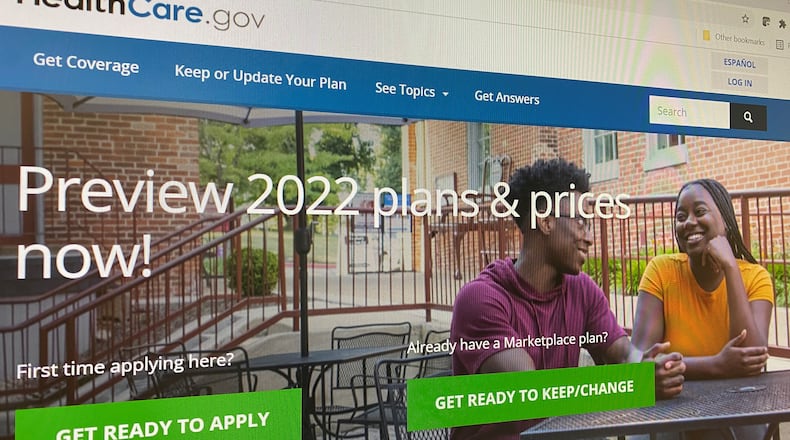Georgians looking for health insurance for 2022 can begin shopping for plans on the Affordable Care Act exchange marketplace starting today. And the market is booming.
Shoppers in areas across the state will find more options this year on the ACA exchange for coverage that can begin Jan. 1, 2022. But the increased competition also means Georgians will need to shop carefully to get the plan that serves their needs.
The number of companies approved in Georgia to offer individual insurance plans nearly doubled, to a total of 11. People will also have more time to shop, as the Biden administration has extended open enrollment for a longer window, ending Jan. 15.
The increasing competition in Georgia has sent prices overall tumbling by double-digit percentages, too, though whether that will benefit the consumer is complicated.
“I think the market is benefiting both consumers and insurers,” said Cynthia Cox, vice president of the the Kaiser Family Foundation, a nonprofit research organization, and director of its program on the ACA. “I would describe it as stable, profitable and attractive to insurers and also to people who are signing up.”
Cox emphasized that shoppers may need help sorting out the options. While prices that insurers set fell, that means that federal subsidies to soften the blow of premiums for policyholders will also fall. So the only way to know whether an individual policyholder’s plan will be cheaper next year is to shop and see.
Cox and other experts also stressed that while shoppers tend to concentrate on a plan’s premium price and deductible amount, it’s critical that they also look at networks.
Each insurance company has a network: A list of hospitals, doctors and other service providers that agree to charge lower prices to that insurance company’s card holders. If the patient goes to those in-network service providers, the insurance works. But if the patient goes out of network for something besides an emergency, the doctor or hospital might not lower the bill to the insurance contract rate, leaving a larger bill for the patient.
Kirk Lyman-Barner, an insurance agent in Sumter County who sells high numbers of ACA exchange plans, said the market has clearly matured, with less see-sawing prices for consumers. Companies appeared to be looking for ways they can tweak plans to make them a bit cheaper and concentrate on offering one or two things that a particular client in a particular part of the state might want. Like the other experts, he said that means smart shopping is imperative.
Consumers can get help comparing plans from websites, navigators, or agents. However, some agents get a financial incentive to push particular plans.
The federal ACA exchange website, healthcare.gov, allows people to compare plans and buy coverage online. It requires shoppers to put in their income level and ZIP code, and then shows them the final price they’d pay for plans in their area.
The plans are listed in groups so the shopper can compare. Importantly, it provides a link to look for each company’s network. Or a shopper can input the name of their preferred hospital system and only search for plans that include that system in their network.
A private website, healthsherpa.com, also helps people comparison shop, and some agents believe it’s easier to use.
Shoppers can also call the phone number on healthcare.gov to speak with a helper, or they can talk to a “navigator” in Georgia.
The Biden administration restored funding for assistance with signing up for ACA plans after the Trump administration cut it back. Navigators are available at three organizations in Georgia: the Georgia Association for Primary Health Care, the Georgia Legal Services Program, and Mercy Care. They will set up help lines and reach out to populations such as rural patients and the homeless.
Once known as Obamacare, the flourishing market is a contrast to five to eight years ago in Georgia, when some insurance companies realized they set prices too low to profit, leading them to abandon the ACA exchange. Others stayed, but prices skyrocketed.
Following that turmoil, Georgia proposed a health care “waiver” program to the federal government that would allow the state to abolish shopping on healthcare.gov and make other changes to the market. The Biden administration and Georgia are currently in a standoff over the proposal.
One of the companies entering the state’s exchange said Georgia now offers the right mix of stable market and opportunity for growth. Friday Health Plans is a company founded in 2015 that entered Georgia, including metro Atlanta, for the first time this year, as well as Oklahoma and North Carolina. It has Piedmont hospitals in its network.
“The way the ACA business is built, it was going to take three years just to get the market stabilized, and we certainly saw that across the country,” said Sal Gentile, CEO and co-founder of Friday. “And now over the past three or four years, I think we’ve gone from stabilized to you know, really healthy.”
Where to Get Help
Federal help for signing up for health insurance on the Affordable Care Act exchange marketplace is available at the following website and phone numbers:
- HealthCare.gov
- 1-800-318-2596
- TTY: 1-855-889-4325
Open 24/7 except holidays
About the Author
The Latest
Featured



